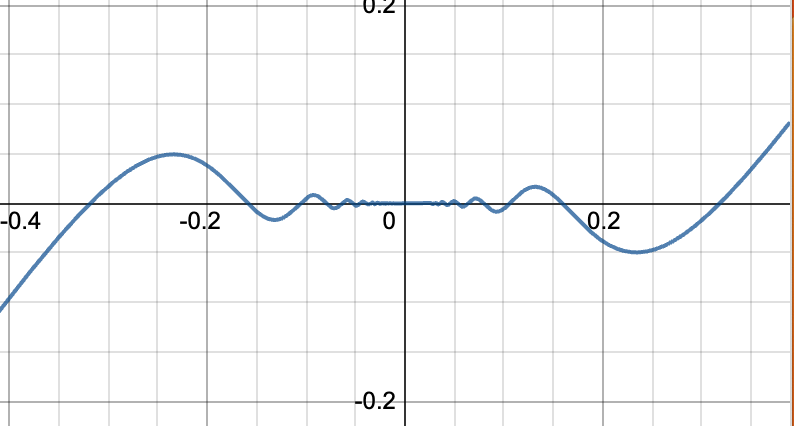
考虑下列问题:
(a) 当x很大时,y会发生什么变化?
(b) 证明f(x)在x=0处是连续的。
(c) 求出x不等于0时的f'(x)。
(d) 找到f'(0)。
(e) 证明f'(x)在x=0处不连续。
(a) 当x很大时,$f(x)$的值会趋近于无穷大或负无穷大,因为$x^{2}$增长的速度比$\sin\dfrac{1}{x}$的振幅变化的速度更快,所以$f(x)$的值会受到$x^{2}$的影响。
(b) 要证明$f(x)$在$x=0$处连续,需要证明当$x$趋近于0时,$f(x)$趋近于$f(0)$。当$x$趋近于0时,$x^{2}\cdot \sin \dfrac{1}{x}$的值会趋近于0,因为$\left\vert x^{2}\cdot \sin \dfrac{1}{x}\right\vert \leq \left\vert x^{2}\right\vert$。因此,当$x$趋近于0时,$f(x)$趋近于$f(0)=0$。因此,$f(x)$在$x=0$处连续。
具体来说,可以使用$\epsilon$-$\delta$的方法来证明$f(x)$在$x=0$处连续:
对于任意给定的$\epsilon>0$,我们需要找到一个$\delta>0$,使得当$0<|x-0|<\delta$时,$|f(x)-f(0)|<\epsilon$。
当$x$不等于0时,$f(x)=x^{2}\cdot \sin \dfrac{1}{x}$。因此,$|f(x)|\leq |x^{2}|$,对于所有的$x$都成立。又因为$x^{2}\to 0$,当$x\to 0$时,所以我们可以选择$\delta=\sqrt{\epsilon}$。这样,当$0<|x-0|<\delta$时,有:$$\left| f\left( x\right) -f\left( 0\right) \right| =\left| x^{2}\cdot \sin \dfrac{1}{x}-0\right| \leq \left| x^{2}\right| <\epsilon$$因此,根据$\epsilon$-$\delta$的定义,$f(x)$在$x=0$处连续。
(c) 当$x$不等于0时,$f(x)$可表示为$f(x)=x^{2}\cdot \sin \dfrac{1}{x}$。使用乘积法则和链式法则,可以求得$f'(x)$为:
$f'(x)=2x\sin\dfrac{1}{x}-\cos\dfrac{1}{x}$
(d) 要找到$f'(0)$,需要求出$f'(x)$在$x=0$处的极限。将$f'(x)$代入上式,得到:
$\lim_{x\to0}f'(x)=\lim_{x\to0}\left(2x\sin\dfrac{1}{x}-\cos\dfrac{1}{x}\right)$
由于$\left\vert2x\sin\dfrac{1}{x}\right\vert\leq\left\vert2x\right\vert$和$\left\vert\cos\dfrac{1}{x}\right\vert\leq1$,因此当$x$趋近于0时,$2x\sin\dfrac{1}{x}$和$\cos\dfrac{1}{x}$都趋近于0。因此,$\lim_{x\to0}f'(x)=0$,即$f'(0)=0$。
hint:为何当$x$趋近于0时,$\cos\dfrac{1}{x}$趋近于0?
这个问题可以从数学上解释。当$x$趋近于0时,$\frac{1}{x}$的绝对值会越来越大,所以$\cos\frac{1}{x}$在单位圆上的振荡频率也会越来越高。具体来说,对于任意的正整数$n$,我们有:
当n是奇数时:$\cos n\pi =-1$
当n是偶数时:$\cos n\pi =1$
因此,当$\frac{1}{x}$趋近于无穷大时,$\cos\frac{1}{x}$在单位圆上的振荡次数会越来越多,同时振荡幅度也会越来越大。这就是为什么$\cos\frac{1}{x}$在$x$趋近于0时会发生快速的周期性振荡。
另一方面,$\frac{1}{x}$在$x$趋近于0时的增长速度是非常快的,因为$\frac{1}{x}$在$x$趋近于0时的导数是无穷大。因此,$\frac{1}{x}$的增长速度会比$\cos\frac{1}{x}$更快,从而可以将$\cos\frac{1}{x}$在$x$趋近于0时近似看作0,并得到$f'(0)=0$的结果。
(e) 为了证明$f'(x)$在$x=0$处不连续,需要证明$\lim_{x\to0}f'(x)$不存在。考虑两个不同的极限路径:$x_{n}=\dfrac{1}{n\pi}$和$y_{n}=\dfrac{1}{n\pi+\frac{\pi}{2}}$。当$n$趋近于无穷大时,$x_{n}$和$y_{n}$都趋近于0。然而,当$n$趋近于无穷大时,$f'(x_{n})$的绝对值趋近于1,而$f'(y_{n})$的绝对值趋近于0。因此,$\lim_{x\to0}f'(x)$不存在,即$f'(x)$在$x=0$处不连续。